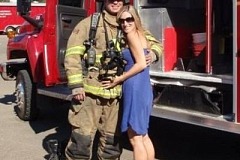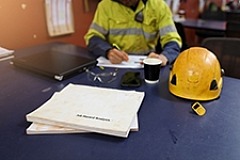 What do safety supervisors have in common with radio disc-jockeys? More than is obvious. Turn on the radio any time and listen to the radio announcers. Really study what they do.
What do safety supervisors have in common with radio disc-jockeys? More than is obvious. Turn on the radio any time and listen to the radio announcers. Really study what they do.
Radio is a cut-throat game that depends on ratings. Take a tumble in the ratings and a DJ can start looking for another job. To stay on top of the ratings requires constant monitoring and improvement. That means weekly airchecks.
Airchecks are one-on-one meetings with the program director; the announcer’s supervisor. The supervisor “checks” the recordings from the announcer’s “on-air” performance. Hence the name... aircheck.
Regular Coaching Sessions
Every time an announcer turns on the microphone, everything that announcer says is recorded. Once per week, the supervisor works with the announcer in a coaching session. One hour of on-air time is assessed for stumbles, segues, relevance, substance and brevity. The basics (time, temperature, station identifications) are covered too. Announcers are praised for what they've done right. They are coached to improve the things that need work. These weekly meetings are meant to improve performance, not condemn.
Now that you know that, listen to radio announcers. Listen for um's, uh's and stumbling over their words. It rarely happens. Why? Because radio announcers get a performance review every week.
The purpose of weekly airchecks is to keep the announcers sharp. Airchecks are coaching sessions. Supervisors keep them improving and don't allow any bad habits to form.
[sidebarright225]
As your business coach, this and other articles I send each month give you new points of view and deliver actionable advice and strategies for your business. If you are interested in discovering how new ways of looking and thinking about your business can make huge changes in sales, profitability and productivity, give me a call or email me, never any obligation. It could be the smartest call you make this year.
[/sidebarright225]
Baseball Managers Do It Too
Compare this idea to baseball. Coaching a player into moving from a .227 batting average to a .230 in a week could mean four extra runs a year. Four extra runs could mean two more wins. And, if every player moved up three points, the team would move up the standings.
So why are safety personnel only talking to workers when they want to address a specific performance issue? Why aren’t managers and supervisors willing to talk about performance otherwise? Why does it seem like feedback only comes occassionally - unless employees are doing something wrong?
Pro athletes get feedaback every day. Basketball, baseball, hockey, football players, golfers all get constant coaching. They are treated like professionals. Are your front-line people not professional enough to get regular feedback?
Individual Pieces Make Up The Jigsaw Puzzle
When you tweak performance in small chunks, little by little, performance improves. It works the same way in safety too. There is no need to overhaul the entire corporate safety culture to get a positive change in safety performance. Concentrate on the individual pieces that make up the jigsaw puzzle. Adjust the small, incremental performances first. Big-picture culture shifts will result.
Supervisors should be doing 50 performance reviews a year - with each crew member. Once a week. Tweaking, fine-tuning, adjusting, praising, instructing and mentoring. That eliminates the need for annual performance reviews. You reinforce good safety practices consistently, all year long.
Good Feedback Builds Solid Teams
When you create regular communication, you reduce ambiguity and improve feedback. People want to know how they're doing. They can't fix what they don't know.
You build a higher-performing team. That reduces turnover. People quit their jobs when they get irregular feedback. It's worse when the only feedback they receive is negative. People will improve if your desire is to help them get better.
When you give useful feedback regularly, you create a level of trust. The more trust you build, the more open to feedback employees become. When you create than openness with trust and consistent conversation, you affect people at a values level. That builds a stronger connection to safety.
In safety, you should always be helping your people to improve.
Be On-Point Always
And one more insider piece of information. Announcers create scripts for nearly everything they say when the microphone is on. That means, every interaction with the listeners is prepared, timed and succinct. They don't ramble on loosely talking about things that have little to do with the point they are trying to make. They give listeners a reason to keep listening. They remove reasons to tune-out. This is good advice when it comes to safety meetings. Prepare. Keep it short and to the point. Don't ramble. Engage. Be entertaining. And, prepare your words to be meaningful.
Are you inspiring your people to want to be better in safety? Or, are you forcing them read every word of your presentation on a PowerPoint slide? Do you want to just throw information at your people? Or do you want them to feel something? Do you want to inspire them to be better in safety?
Become exceptional at communicating. Knowing safety rules isn't enough. Communication of what you know is crucial. Actors rehearse. So do musicians, world leaders, great orators, preachers and yes, even radio DJ's. People who want to move their audiences practice and rehearse. You're never above practice and rehearsal.
When you tweak job performance in small chunks, little by little, safety performance improves.
radio02.jpgWhat do safety supervisors have in common with radio disc-jockeys? More than is obvious. Turn on the radio any time and listen to the radio announcers. Really study what they do.
Radio is a cut-throat game that depends on ratings. Take a tumble in the ratings and a DJ can start looking for another job. To stay on top of the ratings requires constant monitoring and improvement. That means weekly airchecks.
Airchecks are one-on-one meetings with the program director; the announcer’s supervisor. The supervisor “checks” the recordings from the announcer’s “on-air” performance. Hence the name... aircheck.
Regular Coaching Sessions
Every time an announcer turns on the microphone, everything that announcer says is recorded. Once per week, the supervisor works with the announcer in a coaching session. One hour of on-air time is assessed for stumbles, segues, relevance, substance and brevity. The basics (time, temperature, station identifications) are covered too. Announcers are praised for what they've done right. They are coached to improve the things that need work. These weekly meetings are meant to improve performance, not condemn.
Now that you know that, listen to radio announcers. Listen for um's, uh's and stumbling over their words. It rarely happens. Why? Because radio announcers get a performance review every week.
The purpose of weekly airchecks is to keep the announcers sharp. Airchecks are coaching sessions. Supervisors keep them improving and don't allow any bad habits to form.
Baseball Managers Do It Too
Compare this idea to baseball. Coaching a player into moving from a .227 batting average to a .230 in a week could mean four extra runs a year. Four extra runs could mean two more wins. And, if every player moved up three points, the team would move up the standings.
So why are safety personnel only talking to workers when they want to address a specific performance issue? Why aren’t managers and supervisors willing to talk about performance otherwise? Why does it seem like feedback only comes occassionally - unless employees are doing something wrong?
Pro athletes get feedaback every day. Basketball, baseball, hockey, football players, golfers all get constant coaching. They are treated like professionals. Are your front-line people not professional enough to get regular feedback?
Individual Pieces Make Up The Jigsaw Puzzle
When you tweak performance in small chunks, little by little, performance improves. It works the same way in safety too. There is no need to overhaul the entire corporate safety culture to get a positive change in safety performance. Concentrate on the individual pieces that make up the jigsaw puzzle. Adjust the small, incremental performances first. Big-picture culture shifts will result.
Supervisors should be doing 50 performance reviews a year - with each crew member. Once a week. Tweaking, fine-tuning, adjusting, praising, instructing and mentoring. That eliminates the need for annual performance reviews. You reinforce good safety practices consistently, all year long.
Good Feedback Builds Solid Teams
When you create regular communication, you reduce ambiguity and improve feedback. People want to know how they're doing. They can't fix what they don't know.
You build a higher-performing team. That reduces turnover. People quit their jobs when they get irregular feedback. It's worse when the only feedback they receive is negative. People will improve if your desire is to help them get better.
When you give useful feedback regularly, you create a level of trust. The more trust you build, the more open to feedback employees become. When you create than openness with trust and consistent conversation, you affect people at a values level. That builds a stronger connection to safety.
In safety, you should always be helping your people to improve.
Be On-Point Always
And one more insider piece of information. Announcers create scripts for nearly everything they say when the microphone is on. That means, every interaction with the listeners is prepared, timed and succinct. They don't ramble on loosely talking about things that have little to do with the point they are trying to make. They give listeners a reason to keep listening. They remove reasons to tune-out. This is good advice when it comes to safety meetings. Prepare. Keep it short and to the point. Don't ramble. Engage. Be entertaining. And, prepare your words to be meaningful.
the perfect safety meeting ebook Are you inspiring your people to want to be better in safety? Or, are you forcing them read every word of your presentation on a PowerPoint slide? Do you want to just throw information at your people? Or do you want them to feel something? Do you want to inspire them to be better in safety?
Become exceptional at communicating. Knowing safety rules isn't enough. Communication of what you know is crucial. Actors rehearse. So do musicians, world leaders, great orators, preachers and yes, even radio DJs. People who want to move their audiences practice and rehearse. You're never above practice and rehearsal.
- Kevin Burns is a management consultant, safety speaker and author. He believes that the best place to work is always the safest place to work. Kevin helps organizations integrate caring for and valuing employees through their safety programs. For more info and to reach Kevin, www.KevBurns.com. -reprinted with permission














